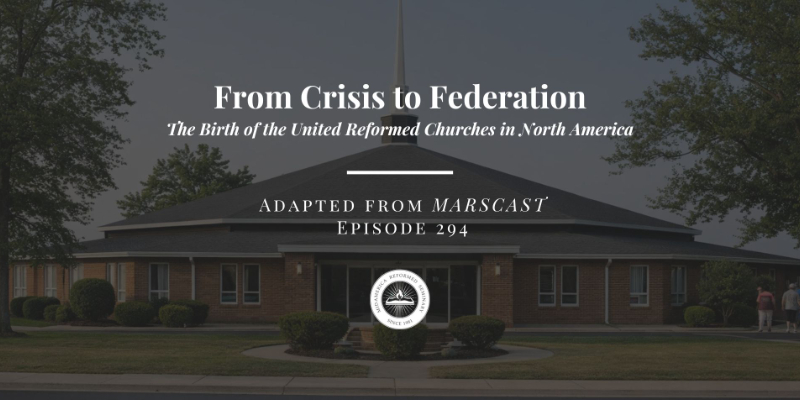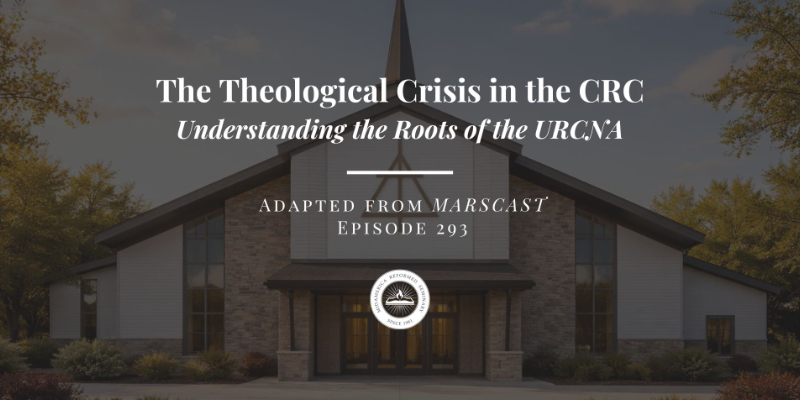
Wrestling with Righteousness: A Reformed Response to Federal Vision Theology
Human nature consistently attempts to insert its own righteousness into the equation of salvation. We fall prey to the idea that we contribute in some measure to our standing before God. However, the gospel testifies to a different reality: our righteousness is entirely alien, imputed to us in Christ alone.
This article (adapted from MARSCAST episode 92) aims to thoughtfully and thoroughly examine the theological concerns raised by Federal Vision theology. Far from being a purely academic controversy of the early 2000s, the issues it raises are perennial: the nature of the sacraments, the doctrine of justification, the relationship between election and covenant, and the means by which grace is applied. These are not peripheral matters, but core components of Reformed orthodoxy. This article will also consider the historical context in which Federal Vision theology developed, the broader confessional tradition it challenges, and the implications of its claims for the life and ministry of the church.
In 2007, the faculty of Mid-America Reformed Seminary released a comprehensive statement titled Doctrinal Testimony Regarding Recent Errors. This document addressed both Federal Vision theology and other related doctrinal deviations, such as the New Perspective on Paul and the views of Norman Shepherd. The following analysis reflects the substance and tone of that document and further unpacks its pastoral and theological significance.
The Federal Vision: Origins and Trajectory
Federal Vision theology emerged at the intersection of several intellectual and ecclesiastical trends. On the one hand, it was a response to what some perceived as a dead orthodoxy, a Reformed tradition more concerned with doctrinal precision than spiritual vitality. On the other hand, it reflected an attempt to recover a more covenantally integrated and sacramentally rich theology of the Christian life, particularly in contrast to evangelical individualism and revivalism.
However, the critique, though in some respects legitimate, yielded a constructive proposal that went beyond confessional bounds. In seeking to correct an undervaluation of the sacraments and covenant promises, Federal Vision theologians adopted a view of covenant membership that blurred the distinction between the outward administration of the covenant and inward participation in its saving benefits. In this sense, the movement represents not a reform within the Reformed tradition, but a deformation that reintroduces long-repudiated errors.
Over time, the implications of Federal Vision theology became increasingly clear. As scholars and pastors analyzed its claims, they identified a pattern of doctrinal confusion: covenantal objectivity was emphasized at the expense of spiritual regeneration, the efficacy of sacraments was elevated to the neglect of the Spirit's sovereign work, and justification by faith alone was functionally denied by redefining faith as embodied obedience. The controversy thus provoked a necessary reevaluation of what it means to be confessionally Reformed.
Doctrinal Testimony: The Seminary's Response
In light of these concerns, the faculty at Mid-America Reformed Seminary drafted and released the Doctrinal Testimony Regarding Recent Errors. This document was intentionally constructed not only as a corrective but also as a confessionally faithful reaffirmation of historic Reformed theology. Modeled in part after the Chicago Statement on Biblical Inerrancy, it presents its case through paired affirmations and denials, clarifying both what the seminary teaches and what it rejects.
The scope of the testimony is broad, indicating the integrated nature of the Reformed system of doctrine. It includes discussions of:
- The historical covenants (Covenant of Works and Covenant of Grace) and their theological significance
- Divine election and its relationship to the covenant community
- The role of law and gospel in the economy of salvation
- The meaning and means of justification, including the instrumentality of faith
- The sacramental theology of baptism and the Lord's Supper
- Church membership and the visible-invisible church distinction
- Perseverance of the saints and the pastoral implications of assurance
Each section addresses a different locus of Reformed doctrine, yet together they demonstrate the cohesion and depth of the confessional Reformed tradition. What becomes apparent is that a deviation in one area, such as the nature of faith, has consequences for every other area, including ecclesiology, soteriology, and sacramentology.
Sacramental Theology: Signs and the Reality to Which They Point
Federal Vision theology's view of the sacraments, especially baptism, presents a decisive break from Reformed orthodoxy. Historically, the Reformed tradition has maintained a careful distinction between the outward sign and the inward grace signified. Baptism, in this tradition, is a visible sign of an invisible reality: it points to the believer's union with Christ, the washing away of sin, and entrance into the covenant community. However, it does not confer these blessings automatically.
In its zeal to uphold the objectivity of covenant membership, Federal Vision theology often collapses this distinction. Baptism is not only a sign of grace but an effectual instrument of salvation itself, such that the baptized person is presumed regenerate, elect, and justified. The result is a kind of sacramental realism that undermines the Reformed understanding of the Spirit's sovereign and effectual calling of the elect through means that are not themselves inherently efficacious.
This view introduces serious theological difficulties. If baptism is efficacious for salvation, then what do we make of baptized individuals who later abandon the faith? Are we to assume that regeneration can be lost? Or must we conclude that baptismal grace is conditional upon future obedience? Either conclusion runs afoul of the biblical doctrine of perseverance and the confessional commitment to the sufficiency of Christ's atonement and the monergistic nature of regeneration.
By contrast, the Reformed confessions teach that sacraments are true means of grace only when joined to the internal work of the Holy Spirit. The Belgic Confession and Westminster Confession (Chapter 27) explicitly deny any intrinsic power in the sacramental elements. Instead, they are instruments employed by God to strengthen faith in those who are already regenerated and united to Christ.
Justification: Redefining Faith as Faithfulness
Among the most critical deviations of Federal Vision theology is its redefinition of faith. While its proponents claim to uphold justification by faith, they frequently redefine faith to include covenantal obedience. Thus, faith is no longer the sole instrument of justification; it becomes an amalgam of trust and works.
This theological move is deeply problematic. According to the Reformed tradition, as expressed in the Belgic Confession (Article 24) and the Westminster Larger Catechism (Q&A 73), faith justifies not because of its own merit or because it is accompanied by good works, but because it receives and rests upon Christ alone for salvation. Works proceed from faith and are acceptable to God only because they are sanctified by grace. They are never the grounds or instrument of justification.
To conflate faith with faithfulness is to fundamentally alter the nature of justification. It introduces a form of synergism into a doctrine that is monergistic by nature. In doing so, it obscures the comfort of the gospel. The sinner's confidence before God rests not in the quality or consistency of his faith, but in the sufficiency of the righteousness of Christ, received by faith alone.
Moreover, this redefinition has practical implications. It encourages introspection and doubt rather than assurance and peace. If justification depends in any measure upon the believer's obedience, then assurance becomes impossible, and the believer is cast back upon his own performance rather than resting in Christ's finished work.
Covenant and Election: Maintaining Crucial Distinctions
The Federal Vision movement also seeks to erase or minimize the distinction between the covenant and election. It presents covenant membership as coterminous with election, thereby denying the classical Reformed understanding of the visible and invisible church. This collapse introduces serious theological tensions.
If every covenant member is elect, then apostasy must either be regarded as a loss of salvation or as evidence that the elect can fall away. Alternatively, if only the faithful among the covenant members are elect, then the promise of the covenant becomes conditional upon human performance. Neither position can be reconciled with the biblical doctrine of unconditional election or the perseverance of the saints.
Reformed theology maintains that the covenant has both an external and internal dimension. The visible church includes both believers and unbelievers, elect and non-elect. Not all Israel is Israel (Rom. 9:6). The promises of God are true and reliable, but they are effectual only in those who receive them by faith, which is itself a gift of God's sovereign grace.
Theologians such as Herman Bavinck, Louis Berkhof, and Geerhardus Vos developed this distinction to guard the objectivity of the covenant while maintaining the necessity of regeneration. Their work demonstrates that it is possible to affirm the richness of covenantal inclusion without denying the necessity of sovereign election and effectual calling.
Pneumatology: The Role of the Holy Spirit
Any theology that overemphasizes the external means of grace at the expense of the Holy Spirit risks reverting to a kind of sacramentalism inconsistent with Reformation theology. In Federal Vision theology, this danger is manifest in its failure to adequately articulate the Spirit's role in the application of redemption.
John Calvin emphasized that the Spirit is the bond of union between Christ and the believer. The Spirit regenerates the heart, illumines the mind, and enables faith. While the Word and sacraments are appointed means, they are not effectual without the Spirit's operation. As the Canons of Dort assert, regeneration is a supernatural work of God, accomplished through the Spirit by means of the Word.
By minimizing this dynamic, Federal Vision theology reverts to a medieval view in which sacraments operate by their very administration. This not only diminishes the sovereignty of the Spirit but also undermines the Reformed understanding of sanctification and assurance. The Christian life is not sustained by sacramental grace alone, but by the Spirit's continual work in applying Christ to the heart and life of the believer.
Assurance: A Theological and Pastoral Concern
The doctrine of assurance is one of the clearest indicators of the health of one's theology. Where assurance is grounded in the work of Christ and received by faith, the believer is liberated to love and serve God in gratitude. Where assurance is based on the believer's obedience or covenantal loyalty, anxiety and spiritual bondage follow.
Federal Vision theology, by conditioning salvation on faithfulness rather than resting it in Christ, undermines the assurance of believers. If baptismal grace can be lost through covenant infidelity, then the believer is left in a state of continual uncertainty. The gospel is no longer good news, but a contract contingent upon ongoing performance.
Reformed theology teaches that assurance flows from the promises of the gospel, the inward testimony of the Holy Spirit, and the evidences of grace in the believer's life. These evidences, however, are not the foundation of assurance. That foundation is Christ alone. As the Heidelberg Catechism beautifully affirms, our only comfort in life and in death is that we belong to our faithful Savior, who has fully paid for all our sins and preserves us such that not a hair can fall from our heads apart from the will of our heavenly Father.
Conclusion: Contending for the Faith Once Delivered
The issues raised by the Federal Vision controversy remain of enduring relevance. They touch on core matters of the gospel, the doctrine of salvation, and the ministry of the church. As such, they demand careful, biblically grounded, confessionally faithful engagement.
The faculty of Mid-America Reformed Seminary, in producing its Doctrinal Testimony, has provided a valuable resource for the church. It calls us to reaffirm the solas of the Reformation, to treasure the ordinary means of grace, and to rest in the finished work of Christ.
May the church of our day continue to proclaim with clarity and conviction: we are justified by grace alone, through faith alone, in Christ alone. And may we do so not merely as a matter of doctrinal precision, but as a matter of pastoral faithfulness and spiritual vitality.
Recommended Reading:
The Doctrinal Testimony Regarding Recent Errors is available on the Mid-America Reformed Seminary website. For further exploration of related topics, listen to our podcast series on the New Perspective on Paul, featuring contributions from Dr. Marcus Mininger, Dr. Andrew Compton, and Dr. Cornelis Venema.
Recent articles




